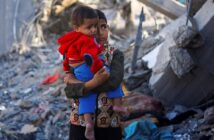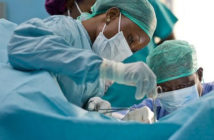The United Nations Children Fund (UNICEF) says its sensitisation on essential family practices in Imo communities is to improve health of children and reduce infant morbidity rate.
Mrs Margaret Ayoka, the Director Primary Healthcare in Imo State Ministry of Health, said this at a sensitisation meeting of UNICEF and women of Amator Amuzu, Aboh Mbaise, held at the UNICEF Experimental School, Central School (1) in Aboh Mbaise Local Government area.
The programme was held in collaboration with the National Orientation Agency (NOA) in Owerri.
Ayoka spoke extensively on the five essential family practices which are exclusive breast feeding, immunisation, proper disposal of feaces, hand washing and anti-natal care for pregnant women.
She described breast milk as the natural milk and first food for babies which provides all the nutrients and energy for healthy growth and development of the child.
She said breast milk contains proteins, fats, vitamins, water and antibodies that help to fight infections in children.
According to her, exclusive breast feeding is a global initiative aimed at improving health of children and reduce infant mortality and morbidity rate.
Ayoka said breast feeding contributes to the health and well being of a mother, helps in child spacing and reduces risks of breast and ovarian cancers.
She said it also increases family and natural resources as it is less expensive and saves cost from hospital bill.
On immunisation, the health director harped on the need to give children the full course of immunisation before their first birthday.
She said that about 200,000 children in Nigeria died each year from diseases that could be prevented with vaccines.
Ayoka identified the 13 killer diseases, which have vaccines that could be given to prevent them, to include tuberculosis, poliomyelitis, hepatitis B, measles, yellow fever, tetanus, pneumonia and retrovirus, aside others.
“Strict compliance to appointments during routine immunisation equips the child’s immune system to fight any of the preventable diseases, while the contrary becomes the case when the immunisation were not received appropriately,” she said .
She said there was still the need for parents to recognise when sick children needed treatment outside the home and take them to the appropriate health providers for health care.
“Appropriate care seeking requires that a household recognises when a child is ill, can interpret when an illness needs to be treated outside the home and seek timely and appropriate medical care,” she said.
Ayoka said that safe disposal of faeces and washing of hands with soap after defecation and before preparing meals and feeding children was very important.
“Faeces are more dangerous source of faecal contamination in the household environment.
“Indiscriminate defecation in the environment, which are left open, will later contaminate utensils, foods, hands and water with faecal pathogens and resultant-oral diseases like diarrhea, typhoid and cholera,” she said.
She harped on effective hand washing, antenatal care for pregnant women, adding that families of pregnant women should encourage them to attend antenatal care and emphasised appointment keeping and taking of their drugs.
Ayoka hinted on the need for communities to totally eradicate female genital mutilation, which she said, was an infringement on the girl child and women’s right.
Mrs Violet Igwe, the Social Mobilisation and Technical Committee (SOMTEC) Desk Officer in the Ministry of Information, said the programme was aimed at enabling women to have an understanding of how to manage their homes, family and children to protect them from killer diseases.
She said that UNICEF and NOA, as international and national organisations, had the interest of the girl child and women at heart and urged women to not only imbibe what they would be thought, but take the message to other women in their various communities
NAN reports that UNICEF and NOA officers had earlier visited women of Apostolic Christian Church Mission, Obizi Group Headquarters, Mbaise Division in Ezinihite Mbaise Local Government area of Imo State still on essential family practices.
Some of the participants expressed gratitude to UNICEF and NOA for bringing the message to their door steps and promised to take the message home.




